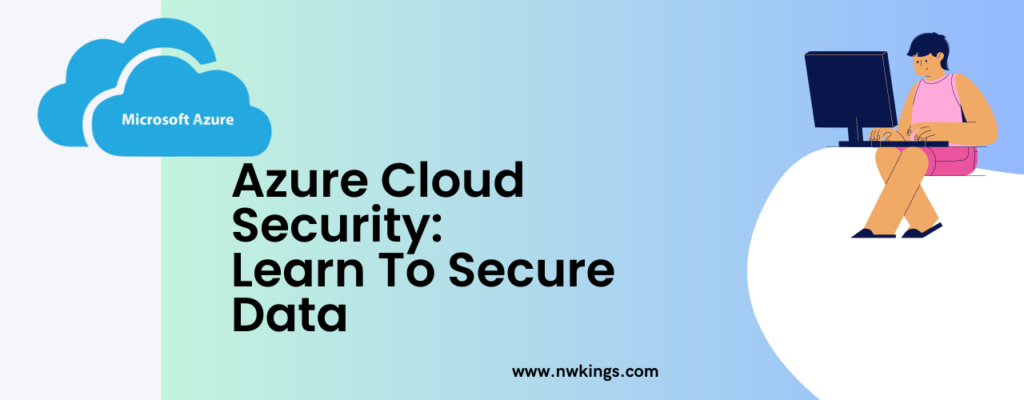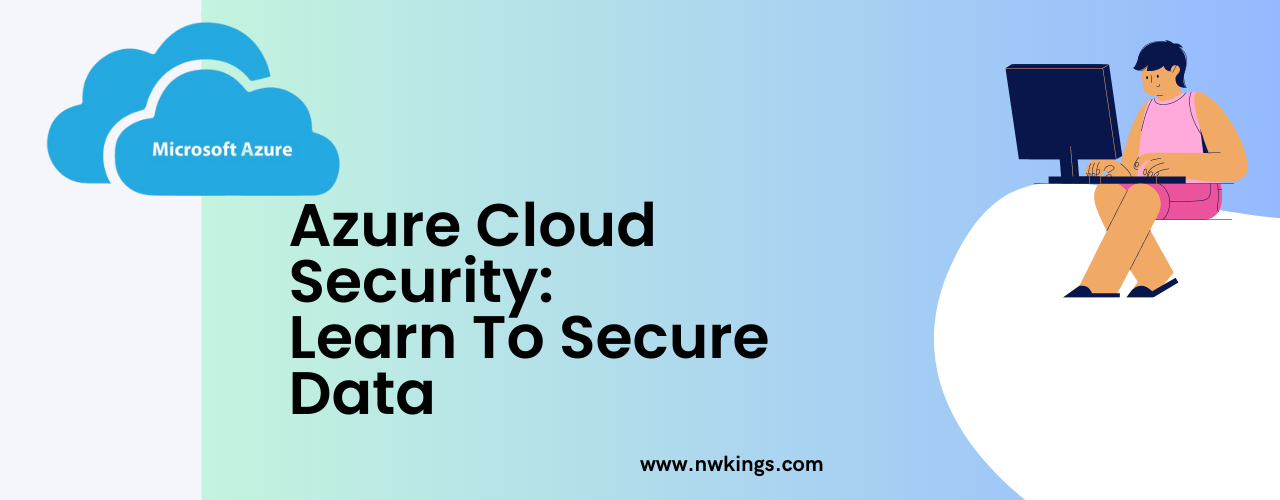
Have you heard about the term Cloud computing in your life? Well, cloud computing is simply the process of managing, accessing and processing the data and software systems online in the market. The need to process data has become necessary because of the over-storage of files and system softwares in companies all around the globe. Therefore, Cloud computing has emerged as an effective way to process and store high-storage files and resources in the global market. After the emergence of cloud computing, now is a need to secure data from malicious hackers in the market. So, let us learn about the Azure Cloud Security certification today.
In this blog, we will get a detailed guide on Azure Cloud Security, its concepts, importance, certifications, job opportunities and salary available in the market.
Hence, continue to read the blog till the end.
Cloud computing is a challenge to security, but one that can be overcome – Whitfield Diffie.
What is Cloud Security?
The term Cloud Security generally consists of two words.
Cloud: –> Cloud means the processing of computer resources over the internet.
Security: –> In general, security is the process of securing or protecting any data and system softwares over the internet.
Therefore, Cloud Security refers to the process of securing or protecting technologies, software control policies and systems of cloud data and resources from the threats in the market.
There are mainly six types of Cloud Security:-
- Identity and Access Management (IAM).
- Network and Device Security.
- Security Monitoring or Alerting.
- Governance.
- Disaster Recovery and Business Continuity Planning.
- Legal Compliance.
Hence, Cloud Security plays a vital role in protecting the data and computer systems of businesses, enterprises and companies.
What is the importance of Cloud Security?
With the evolution of Cloud computing, the need to secure cloud services also emerged as a necessity to protect the data and computer resources of companies and organizations all over the globe. The importance of Cloud Security is as follows:-
- Access Management:- Cloud Security enables users to effortlessly access and manage data and systems softwares without any threats of getting hacked in a company or organization. Therefore, the above-described point justifies the importance of Cloud Security in the market.
- Disaster Management And Recovery:- Cloud Security helps users in crisis management by recovering stolen data and software systems of businesses, enterprises and companies in the market. Hence, Cloud Security plays a crucial role in backing up and recovering hacked data computer resources in the market.
- Helps in Managing Remote Work:- Cloud Computing has made data accessibility easier, and one can access the data anywhere and anytime. Therefore, a need to protect data emerged. Hence, Cloud Security helps to protect your data from security risks making your data susceptible to malware and phishing.
Maintains Policies and Regulations:- Cloud Security help to comply with policies and regulations related to data management and software system tools of companies all around the globe. Therefore, Cloud Security protects your computer resources and provides numerous benefits to support your workload across the industry.
What is the Azure Cloud Security Certification Program?
The Azure Cloud Security Certification Program is for people who want to specialize in Azure cloud security using cloud and security techniques. Azure Cloud Security training program covers the fundamentals of cloud security and the advanced security features of the Information and Technology industry along with Azure. In the Azure cloud security certification program, a candidate will learn advanced-level Azure cloud security skills and technologies that help individuals to boost their value in the job market.
AZ-104: Microsoft Azure Administrator
In AZ-104: Microsoft Azure Administrator certification course, a candidate will get to learn the following concepts:
- To implement, monitor, and manage the Microsoft Azure environment in businesses, enterprises or companies.
- In this certification course, a candidate will learn in-depth about virtual networks, computing, storage, identity, security, and governance.
- A candidate will learn and understand the concepts related to operating systems, servers, networking and virtualization.
- A candidate will learn about PowerShell, Azure portal, Azure CLI, Azure Resource Manager templates (ARM), Microsoft Azure Active Directory (Azure AD), and Microsoft Entra.
AZ-700: Designing and Implementing Microsoft Azure Networking Solutions
In the AZ-700: Designing and Implementing Microsoft Azure Networking Solutions certification course, a candidate will get to learn the following concepts:
- A candidate will gain in-depth expertise in planning, implementing, and managing Azure networking solutions.
- A candidate will get introduced to core network infrastructure, application delivery services, hybrid connectivity, and network security.
- A candidate will learn to optimize the performance and Azure networking solutions security.
- A candidate will learn to deploy network solutions with the help of the Azure portal, command line interface and templates.
- You will learn technologies to monitor network environments to identify issues.
- A candidate will learn to create and manage storage, computing, and networking resources in Azure.
- A candidate will grasp the concepts of networking fundamentals such as network protocols, network address management, etc.
AZ-500: Microsoft Azure Security Technologies
In AZ-500: Microsoft Azure Security Technologies certification course, a candidate will get to learn the following concepts:
- An individual will learn to manage, implement and monitor security for resources in multi-cloud, Azure, and hybrid environments.
- A candidate will become aware of security components and configurations to protect identity & access, applications, data, and networks.
- A candidate will learn to manage security posture, perform threat modelling, implement threat protection, and identify vulnerabilities.
- A candidate will learn computing, networking, and storage in Azure.
- A candidate will understand the Azure portal, active directory, and other Microsoft concepts.
Which is the best platform to apply for Azure Cloud Security training?
Network Kings is one of the famous and emerging ed-tech platforms which provides online certification courses on all main domains (like Networking, Cloud Computing and Cybersecurity) of the IT industry in the market. They are popular in arranging live interactive sessions for their students. A candidate who enrolls for any certification course with Network Kings will get the advantage of technical skills from the best industry experts in the market.
Why choose Network Kings for Azure cloud security course?
Below-described are the points that state the value of Network Kings in the IT:-
- Live Interactive Sessions:- Network Kings is famous for providing live interactive classes to students. Live Interactive Sessions help students to get instant solutions to queries which further helps them to understand the concepts effortlessly.
- Industry- Experts:- Students who enrol for any certification course with Network Kings will learn from the best industry experts in the market. Therefore, an individual will get theoretical with practical knowledge during the certification course.
- Virtual Labs:- Network Kings provides access to virtual labs with zero downtime in the market. It helps a candidate to get hands-on experience before entering the real world of the technological industry.
- Master Programs:- A candidate can get access to our master programs with reasonable costs in the market. Master Programs will help you boost your profile value in the job market.
- Web Portal:- Network Kings helps to provide access to their web portal that will help a candidate monitor the academic growth of your certification program.
What is Azure Security Architecture?
Azure Security Architecture is a unified infrastructure security management system that supports the security posture of your data centres in the industry. It also delivers advanced threat security across your compound workloads in the cloud and on-premises.
What is the Shared Responsibility Model of Cloud Security?
The Shared Responsibility Model is a safety and compliance framework that summarises the duties of cloud service providers (CSPs) and clients for securing every characteristic of the cloud environment, including hardware, infrastructure, endpoints, data, configurations, settings, operating system (OS), network controls and access rights.
What is the Azure Security Center?
Microsoft Azure Security Center is a set of management tools used for monitoring and controlling the security of virtual machines and other cloud computing resources within the Microsoft Azure public cloud. Administrators of businesses, enterprises or companies access the Azure Security Center via the Azure management portal.One of the main advantages of Azure Security Center is it helps to detect security threats early with unique analytical and intelligence tactics in businesses, enterprises and companies.
What are the key Features and Tools of Azure Cloud Security?
The key features and tools of Azure Cloud Security are as follows:-
1. Identity and Access Management
- Azure Active Directory:- Azure Active Directory or Azure AD is a cloud-based identity and access management assistance that helps to access external resources, such as Microsoft 365, the Azure portal, and thousands of other SaaS applications in the industry. Azure Active Directory also helps its users to access internal resources like apps on your corporate intranet and any cloud apps developed for your organization.
- Multi-Factor Authentication:- Multi-Factor Authentication or MFA is one of the other identity and access management tools of Cloud Security. It is a multiple-step login process that helps to spot the real identity of a user trying to access any data or computer resources by using numerous methods like sharing a verification code on the mobile number or email account of the user.
2. Network Security
- Virtual Networks:- Virtual Networks or (VNETs) are the analytical or logical representation of networks in the cloud. It allows an individual to define your private IP address space and segment the network into subnetworks. VNets serve as a syndicate boundary to host your compute resources such as Azure Virtual Machines and Cloud Services (web/worker roles).
- Network Security Groups:- Network Security Groups or NSGs are the pathways to initiate a rule or access control list (ACL), which authorises or rejects web traffic to your virtual device instances in a virtual network. NSGs can be associated with subnetworks or individual virtual machine representatives within that subnetworks.
3. Data Security
- Azure Key Vault:- It is a cloud service for securely keeping and accessing secrets such as passwords, certificates, or cryptographic keys.
Additionally, Azure Key Vault service supports two kinds of containers: vaults and managed hardware security module(HSM) pools.
- Azure Storage Encryption:- Azure Storage Encryption provides encryption-at-rest and safeguards data to meet the security and compliance responsibilities of businesses, enterprises or companies.
It enables default for all managed disks, snapshots and images in all the public and regions.
4. Threat Detection and Monitoring
- Azure Security Center:- Azure Security Center is a collection of tools for scanning and managing the protection of virtual machines and additional cloud computing resources within Azure public cloud.
Cloud Security Administrators access the Azure Security Center through the Azure management portal.
- Azure Monitor:- Azure Monitor is a considerable management solution for collecting, analyzing, and responding to telemetry (Telemetry is a tool used to collect, transmit and manage data through remote sources) from your cloud and on-premises environments.
5. Compliance and Governance
- Azure Policy:- Azure Policy helps to execute corporate standards and to evaluate compliance at scale. With the help of its compliance dashboard, it delivers an aggregated opinion to assess the overall state of the domain, with the capability to plug down to the per-resource, per-policy granularity.
- Azure Security and Compliance Blueprints:- Azure Blueprints are the blueprints which make it possible for development teams to quickly build and create new environments with the trust they are building within corporate compliance with a set of built-in elements, such as networking, to speed up development and delivery of services in businesses, enterprises or companies.
Which are the best practices for Azure Cloud Security?
The best practices for Azure Cloud Security are as follows:-
1. Strong Identity and Access Management
- Implementing Role-Based Access Control:- Role-Based Access Control (RBAC) is a mechanism that helps to restrict networks and system access based on the roles of an individual user in an enterprise or company. Therefore, Implementing Role-Based Access Control is considered one of the best practices for Azure Cloud Security.
- Regularly reviewing and managing access permissions:- To secure or protect the data and computer software system of businesses, enterprises or companies, one should evaluate and manage access permissions regularly.
2. Secure Network Configuration
- Implementing Network Segmentation:- One of the other best practices of Azure Cloud Security is implementing Network Segmentation in a company. It is the method of dividing a network into smaller, distinct sub-networks that enable network teams to order the sub-networks and deliver exceptional protection controls and services to each sub-network.
- Restricting inbound and outbound traffic:- To understand this point, let us clarify the difference between Inbound and Outbound Traffic.
Inbound traffic: –> Inbound traffic is the traffic that is emerged from outside the network systems of a business, enterprise or company.
Outbound traffic: –> Outbound traffic is the traffic that is emerged from inside the network systems of a business, enterprise or company.
Therefore, Restricting inbound and outbound traffic can help you to secure business and enterprise data and software systems in the market.
3. Data Protection and Encryption
- Leveraging Encryption At Rest and In Transit:- Encryption at rest refers to the encryption used to store data. Encryption at the source, where data is developed and stored at the origin.
Encryption in transit: secures your data if connections are disturbed while data transfers between your site and the cloud provider or between two services.
- Implementing data classification and labelling:- Data classification groups by themselves are merely labels (or tags) that indicate the value or sensitiveness of the content. It further helps to protect the data by dividing it into various classification frameworks of the system softwares in the industry.
4. Continuous Monitoring and Threat Detection
- Enabling Azure Security Center Recommendations:- Recommendations — delivers a list of suggestions for creating Azure security policies based on the security needs of your specific Azure resources. Possible recommendations include deploying a missing system update, provisioning antimalware and using network security groups to control VM traffic in the industry.
- Utilizing Azure Monitor Alerts and Logs:- Alerts help you detect and manage issues before users notice them by proactively notifying you when Azure Monitor data signifies there might be a problem with your infrastructure or application. One can alert on any measured or log-based data source in the Azure Monitor data platform.
5. Compliance and Regulatory Considerations
- Understanding Industry-Specific Regulations:- Industry-specific regulations are additional policies that should interwork into your daily commercial life in addition to the regulatory responsibilities of employment relationships.
- Leveraging Azure Compliance Offerings:- Azure subordination offerings are based on various kinds of guarantees, including proper certifications, attestations, validations, authorizations, and assessments produced by independent third-party auditing firms, as well as contractual transformations, self-assessments, and customer guidance documents produced by Microsoft.
Each offering statement in this document provides up-to-date scope report indicating which Azure customer-facing benefits are in scope for the examination, including links to downloadable that helps to assist customers with their compliance duties.
What are the advanced strategies to enhance Azure Cloud Security?
The advanced strategies which help users to enhance Azure Cloud Security are as follows:-
1. Azure Sentinel for Security Orchestration and Response:- SOAR stands for security orchestration, automation, and response. SOAR seeks to relieve the pressure on IT teams by incorporating automated reactions to several events.
SOAR system is also programmed to custom-fit a corporation’s needs, which helps to give groups the power to decide how SOAR can achieve high-level objectives, such as saving time, reducing the number of IT staff, or releasing current staff members to engage in creative tasks.
There are numerous advantages of SOAR which are as follows:
- Meet Budgetary Needs
- Enhance Time Management and Efficiency
- Manage Incidents More Effectively
- Flexibility
- Enhanced Collaboration
2. Azure DDoS Protection for Network Resilience:- Azure DDoS Protection applies three auto-tuned mitigation policies (TCP SYN, TCP, and UDP) for each shared IP of the protected resource in the virtual network that has DDoS enabled. The policy points are auto-configured via device learning-based network traffic profiling.
3. Azure Information Protection for Data Classification and Protection:- Azure Information Protection (AIP) is a cloud-based solution that enables corporations to protect papers and emails by applying labels.
4. Azure Firewall for Enhanced Network Security:- It is a managed, cloud-based network protection service that protects your Azure Virtual Network resources. The stateful firewall service has built-in high availability and available cloud scalability to assist you to create, enforce, and log application and network connectivity policies across subscriptions and virtual networks.
5. Azure Private Link for Secure Connectivity:- It provides remote connectivity from a virtual network to Azure platform as a service (PaaS), customer-owned, or Microsoft partner services. It facilitates the network architecture and ensures the connection between endpoints in Azure by eliminating data exposure to the public internet.
What are the challenges of Azure Cloud Security?
Below-mentioned are the challenges of Azure Cloud Security:-
1. Data Breaches and Insider Threats:- An insider threat refers to a cyber security risk that originates from within an organization. It generally occurs when a current or former employee, contractor, vendor or partner with legitimate user credentials misuses their access to harm the organization’s networks, systems and data.
2. Misconfigurations and Human Error:- An inaccurate or suboptimal composition of an input system or system segment that may direct to vulnerabilities is known as Misconfiguration.
- Phishing: Phishing is related to fraudulent emails and other communications that looks they come from a reputable source. Hackers tries to hack the sensitive data such as banking, personal identity, and password information.
- Denial of service: Denial of service is an attack that floods the network with traffic that uses up resources and bandwidth. It helps to render the system unresponsive to legitimate requests from official users.
- Malware: Malicious software such as trojans, worms, and viruses. The purpose of a malware attack is to damage the system by spreading malicious software to a business, enterprise or company.
- Ransomware: Ransomware is a malware attack that holds data hostage of a business, enterprise or company.
3. Denial-of-Service (DoS) Attacks:- A Denial-of-Service (DoS) is an attack meant to close down a machine or network, making it unavailable to its intended users. Denial-of-Service attacks execute this by flooding the mark with traffic or sending it information that initiates a collision.
4. Solutions and Mitigation Strategies:-
- Implement identity and access control.
- Use multi-factor authentication.
- Require strong passwords.
- Monitor user behaviour.
- Identify and revoke excessive access to sensitive data.
- Remove unused accounts and credentials.
- Apply the principle of least privilege.
- Control third-party access.
- Train employees on preventing account hijacking.
What are the available job options after Azure Cloud Security course training?
A candidate has numerous career development opportunities available after completing Azure cloud security certification training:-
- Cloud Security Architect
- Network Security Engineer
- Cloud Security Engineer
- Information Security Analyst
- Cloud Security Consultant
- Network Administrator
- Cloud Security Operations Manager
- Security Compliance Analyst
- Cloud Security Analyst
- Network Security Administrator
- Cloud Penetration Tester
- Security Operations Center (SOC) Analyst
- Cloud Security Auditor
- Network Security Consultant
- Cloud Incident Responder
- Security Solutions Architect
- Cloud Security Manager
- Network Security Specialist
- Cybersecurity Operations Manager
- Certified Information Systems Security Professional (CISSP)
What is the expected salary after Azure Cloud Security certification courses?
Certification courses in cloud computing can help a candidate to get a high-package job in the market. Given below is the list of the expected salary which one can get after completing a Azure cloud security certification course and training:-
- United States: USD 90,000 – USD 160,000 per year
- Canada: CAD 80,000 – CAD 130,000 per year
- United Kingdom: GBP 50,000 – GBP 90,000 per year
- Germany: EUR 60,000 – EUR 100,000 per year
- France: EUR 50,000 – EUR 90,000 per year
- Australia: AUD 90,000 – AUD 150,000 per year
- United Arab Emirates: AED 180,000 – AED 350,000 per year
- Singapore: SGD 80,000 – SGD 150,000 per year
- India: INR 600,000 – INR 1,200,000 per year
- Japan: JPY 8,000,000 – JPY 14,000,000 per year
Conclusion!
Azure Cloud Security helps you to protect or secure data and software systems in businesses, enterprises or companies. Therefore, In this blog, we have discussed Azure Cloud Security, its technical concepts, advanced strategies to enhance Azure Cloud security, certification courses, career opportunities and expected salaries that one can get after completing training in Azure Cloud security.
If you also want to become a Cloud Security expert engineer, enrol for the Azure Cloud Security certification program today.
Stay Tuned! for more such interesting and enlightening articles.
Enjoy Learning!




